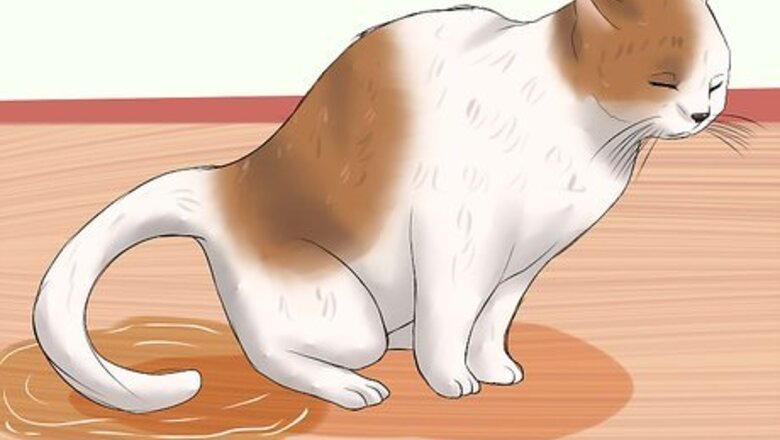
views
X
Research source
But chronic (long-term) stress isn't so easy to pinpoint. If you are wondering if a change in your household has negatively affected the family cat, follow these steps for diagnosing the problem.
Checking for Digestive Issues
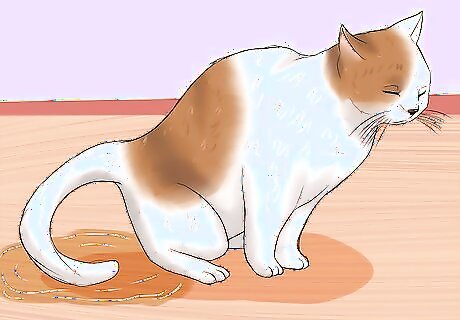
Watch where they urinate. Cats, as you probably know, are meticulous cleaners. This affinity for cleanliness extends to their waste. They will use a litter box if it is provided, only eliminating waste outside this box or other designated area (like loose sand or earth in the yard) in times of distress. Peeing outside a litter box is a sign that something is wrong rather than an act of rebellion. The cat may be ill or highly stressed, and when you see this behavior, you need to pay attention. Do not attempt to punish a cat who urinates outside its bathroom area. The cat isn't trying to make a mess—it is trying to communicate that it needs help. Punishment will further stress and frighten the cat. There are other reasons a cat may choose to defecate outside the litter box, such as discomforts. Make sure you eliminate these before concluding that your cat is stressed.

Keep an eye on bowel movements. Aside from location of urination, you should watch for diarrhea and constipation. Changes in a cat's environment cause stress, and bowel movements are often affected. You can spot cat diarrhea by its soft, watery texture and either light brown or dark brown color. If there is blood in the diarrhea, you actually don't need to worry about it unless there is a very large amount of blood. Take your cat to the vet if it persists in passing diarrhea stools, or can't pass stools at all, for more than a few days.
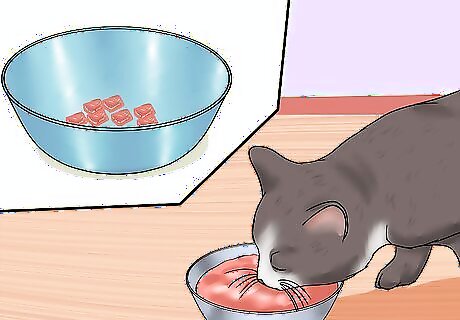
Measure how much they are eating. One response to stress in a cat is a loss of interest in food. Cats often become solitary and avoid things they usually enjoy when stressed, including food and mealtimes. Cats don't go on fasts like humans sometimes do, so avoiding food is a warning that something is wrong. If you leave your cat a bowl of food as you leave the house for the day, keep an eye on how much is left in it when you get home. If someone else feeds the cat, tell them to carefully observe the cat's eating habits each day if you suspect the cat is stressed.
Noticing Excessive Behaviors
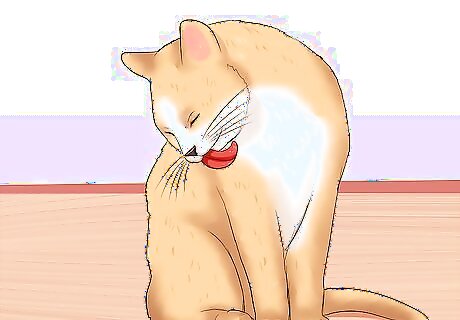
Pay attention to excessive grooming. Of course we all know how often cats groom, licking themselves and their kittens most of day. But when you notice that your cat can't seem to do anything else, you should be alarmed. This isn't normal, and is often a sign that something is wrong; it's even a sign of depression. They can potentially lick hair off their bodies. If you notice patches of hair falling off your cat without any other signs of infection, you probably are dealing with excessive grooming. If you determine excessive grooming is the cause of bald spots on your cat, seek out a vet for advice.
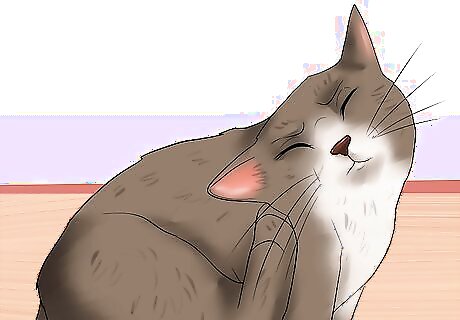
Be on alert for excessive scratching. Although cats can scratch for many different reasons, including fleas and skin infections, scratching compulsively all day is a sign of stress. Take action if you see excessive scratching by either determining a source of stress or contacting the vet. Fleas can keep cats pawing and scratching incessantly, especially if they are allergic to flea saliva. Make an effort to keep your cat free of fleas before determining its excessive scratching is related to stress. Check for scratches, scabs, or bumps under your cat's fur. If you don't find any of these signs of infection, tithe scratching may indeed be related to stress.
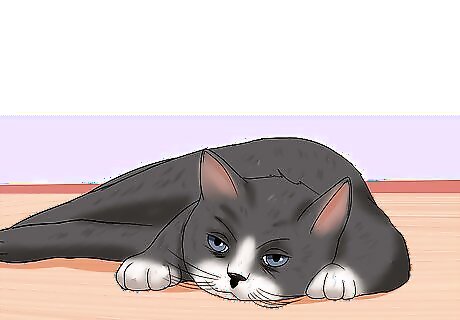
Be concerned about decreased sleeping. When cats become stressed, they can reduce the amount of sleep they get. If your cat is showing signs of restlessness, pay attention.
Watching for Changes in Social Behavior
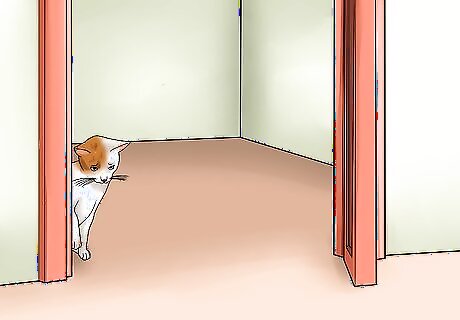
Notice when your cat isolates itself. Even though cats aren't known for being the friendliest creatures, often preferring to be by themselves rather than constantly in owners' arms, they should not be constantly trying to get away from people. This can be a sign that they need a reduction in environmental stressors. If your cat consistently ducks out of the room or dodges behind furniture every time someone enters the room, you should try to figure out what's wrong. New cats may hide more than cats who are accustomed to their homes, so don't be alarmed if your new cat hides for a while after moving in.

Be concerned about aggression toward other animals. If you have a cat cohabitating with other pets, it should be easy to tell if aggression is a normal behavior or not. If your cat consistently snaps at or picks fights with animals it used to play happily with, the cat very well may be stressed. Your cat may be sick instead of stressed, so identify any stressors that could be triggering this behavior before heading to the vet.
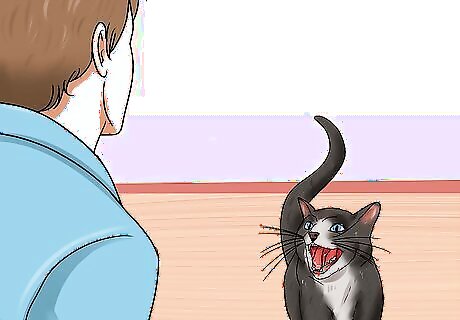
Address aggression toward people. You are also probably attuned to how your cat interacts with other humans. If your cat used to be warm toward people, or even passively accepted their presence, and suddenly starts lashing out, you have a problem. Again, if you are mystified by this aggression, take stock of your home environment and identify any stressors. If there aren't any, the cat may be sick.
Finding Solutions to Stress
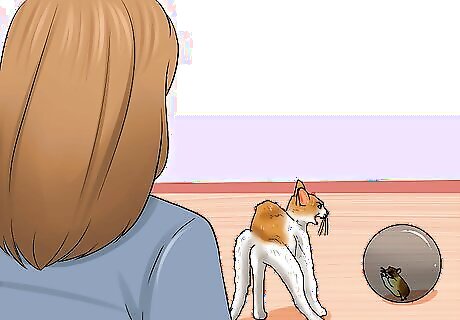
Identify stressors for your cat. There are many reasons why a cat may be living in a state of constant stress, and most of them have to do with changes in its environment. If you think your cat is stressed, look around for ways to Reduce Stress in Cats or help them adjust. Stressors can include changes in routine, a new pet or person in the home (or a pet or person leaving the home), new smells, new noises, new furniture, construction in your home's vicinity, moving, even a new cat in the neighborhood.
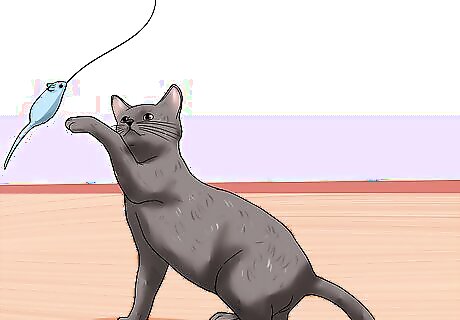
Set a daily routine and keep it. One way to help eliminate stress if you suspect your cat is suffering is to make sure you are keeping a set schedule, at least for the cat. Changes in routine, or not having a daily routine in the first place, can keep your pet in a constant state of stress even if nothing else is going on. And if there are other stressors, making a schedule can only help. If there is only a temporary change going on, such as vacation, get back into the old routine as quickly as possible.
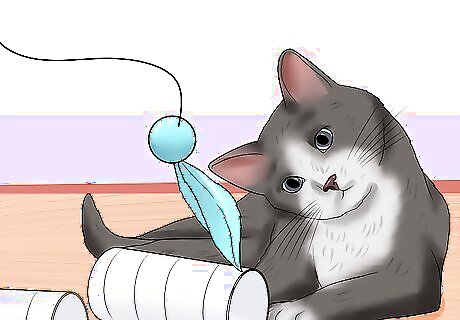
Play with your cat. The principal is true for both cats and humans—physical activity takes away stress. Playing with your cat just 20 to 30 minutes split into two segments (like morning and afternoon) may relax it. Keep playtime as part of any routine so that your cat can get out nervous energy and be distracted from fixating on any changes until they are complete. Give the cat some toys, rotating them on a monthly basis to maintain interest. End by offering the cat a treat, or schedule playtime just before a meal.
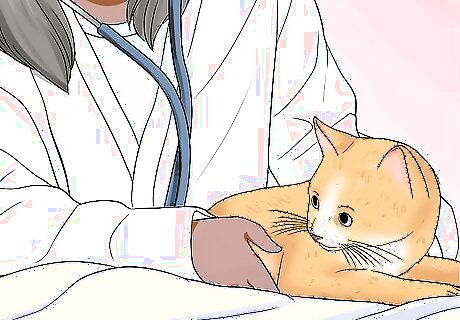
Take your cat to the vet. For any of the symptoms listed in these steps, you can contact a vet for advice. Some of these symptoms may indicate a problem other than stress, so getting cleared by the vet first may make it easier to clear out stressors.

















Comments
0 comment